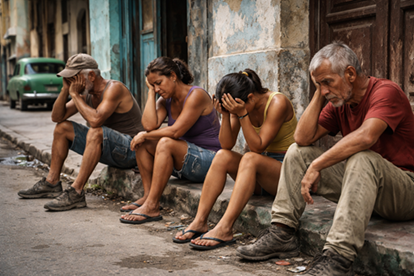
“Maybe the greatest madness is to see life as it is rather than what it could be.”— Don Quixote, Cervantes
I have lived within the continental United States for several decades now. Before living in this country on a permanent basis I attended one of the Historically Black Colleges and Universities (HBCUs) for four years in Washington, D.C. I have not only experienced the freezing cold and the deluge of snow of the north, but also the glaring sun and the sweltering heat of the south. I have not been to many states, but I have had the opportunity to, physically, touch the ground on the east as well as on the west coast.
Socially, I have summered and I have wintered here in the United States — having gotten married here, having attended the weddings of others, having attended funerals of the young and the old — including that of my mother-in-law who died in New York, and that of my mother who had died years before in Maryland, just a few days before the attacks on the twin towers in New York and on the Pentagon building in Washington, D.C. In fact, those attacks occurred the day before her memorial service was scheduled to take place in Washington, D.C.
I can recall being caught in traffic in my brother’s vehicle, driving up from Florida, along with my sister-in-law and my wife as we listened to the breaking news on the radio, and as we watched the tragedy in New York unfold on a small portable television screen that we had in the car, and as we saw black smoke billowing from the Pentagon in the distance. While we were stuck in traffic, sirens blared in the streets from emergency vehicles as they sped to and fro like angry hornets. Those were stressful times but I was able to weather the mental and emotional storms and keep my wits about me.
I have been there for graduation ceremonies, for U.S. Naturalization citizenship ceremonies, for the births of babies and for their blessings in churches. I have been to birthday parties, I have been to get-togethers of family and friends, and I have attended office parties and picnics. I have been interviewed, rejected and hired for various jobs. I have experienced the intrigues of office politics, the joys of promotions, the pain of company closures and of layoffs. I have collected unemployment cheques. I know what it is to be rehired. I have paid my federal taxes, and I have paid into Social Security and into Medicare. Those experiences presented challenges, but there, too, I was able to confront, to survive and to overcome them.
I have, like millions of Americans, cast my vote during the various election cycles in polling booths, and I have nervously watched on television as the results slowly came in. I know the disappointment when my candidates did not win and the sheer relief when they actually did. I know what it is to stand in the freezing cold on the Washington Mall to witness a presidential inauguration. I have read the U.S. Constitution several times — that to which I took a solemn oath — and I did so within the broader context of my reading of U.S. history.
I have read books on American law so that I could better understand and appreciate the social, the cultural, the political and the economic dynamics of national life. I have read about the lives of such people who laid the groundwork on which we operate today — of such personages like George Washington, John Adams, Thomas Jefferson, James Madison, Alexander Hamilton, Benjamin Franklin, Abraham Lincoln, Andrew Jackson, Theodore Roosevelt and Franklin D. Roosevelt. I was told how such men, along with many others, had built this nation on the ideas of the vaunted civilizations of ancient Greece and of Rome. I have been told that getting a good dose of Western philosophy and politics would inoculate me against the scurvy of “wokeness”. The advice, under normal circumstances, might have seemed logical, but for the fact that most Americans I have found do not like to read, and frown upon those who do as elites.
And just to be on the safe side, in order to get as broad a perspective of this country as I could, as a Black man from the Caribbean, I made sure that all of my bases were covered by reading about the lives and learning from the testimonies of Black folk like Frederick Douglass, Harriet Tubman, Sojourner Truth, Booker T. Washington, Marcus Garvey, Mary McLeod Bethune, Dr. W.E.B. Du Bois, Ida. B. Wells, Dr. Alain Locke, Dr. Carter G. Woodson, Zora Neale Hurston, Claude McKay, Dr. E. Franklin Frazier, Dr. Martin Luther King, jr., James Baldwin and Malcolm X.
My desire was not just to live among the people in my adopted homeland, but, again, to be able to know enough about them in order to be as one of them. I had drawn my line in the sand and I had wanted, through the process of enculturation, to consolidate or to solidify my place in the American society, for good or ill.
But, what had all that effort manage to accomplish for me when I am now being told, by the U.S. government, that the words contained in the Constitution — especially those aspects that a child just having learned to read can understand — do not mean what they actually say, in very plain language? I think the medical and psychological professionals have a term for such behaviour, that being, “cognitive dissonance”.
Psychology, which I minored in while I was at university, outlined cognitive dissonance as a mental phenomenon in which people unknowingly hold fundamentally conflicting cognitions. Being confronted by situations that challenge this dissonance may ultimately result in some change in their cognitions or actions to cause greater alignment between them so as to reduce this dissonance. Relevant items of cognition include peoples’ actions, feelings, ideas, beliefs, values, and things in the environment. Cognitive dissonance exists without signs but it surfaces through psychological stress when persons participate in an action that goes against one or more of conflicting things.
According to this theory, when an action or idea is psychologically inconsistent with the other, people automatically try to resolve the conflict, usually by reframing a side to make the combination congruent. Discomfort is triggered by beliefs clashing with new information or by having to conceptually resolve a matter that involves conflicting sides, whereby the individual tries to find a way to reconcile contradictions to reduce their discomfort. From all that I have been witnessing in the news, this seems to describe America today, and I do not want to come down with that malady. But, I digress. Let me resume my trend of thought.
What am I to think when some among us have chosen to interpret the words of the U.S. Constitution to mean, for example, that corporations are like people having the same rights and privileges as flesh and blood individuals, and that we can have law and that we can have order without having “due process of law”? What am I to tell outsiders, when the document that is so unambiguous, so unequivocal and so vociferous about people having been born here being citizens, raises questions among some within society about what “birthright citizenship” really means? What do I tell the peoples of the world about guardrails installed to protect us from the whims of felons in our streets, in our homes, in our places of work and of play, in our churches and in the marketplace, but not against any of them holding the reins of national political power, especially as unqualified, as reckless and as vindictive individuals?
What do I say when the courts ban abortions because they kill babies, only to save them as future prey in schools to be hunted and to be gunned down by deranged perpetrators? What do I say to those who ask why the teaching of African American history, and why the teaching on “cultural inclusion”, done in order to foster a better understanding of those in the populace, are banned, but, on the other hand, why the sky is the limit on any way which can be conceived of by some who wish to undermine our democracy in order to build a tall, a hard, and a cold edifice dedicated to oligarchy and to totalitarianism?
How do I explain how our traditional, life-long international partners became our enemies overnight, and how our sworn, mortal enemies became our bedfellows? How did the philosophy of the “Fairness Doctrine”, which was created to protect free speech for all, for both rich and poor, become deemed as unfair, and was, consequently, abolished so that free speech is now, largely, part of the preserve of the wealthy? Why is it, in recent times, that it is so very hard for me to focus on or to take seriously anything written by or about Americans?
Whence this apoplexy of heart and of mind for the much heralded American idealism? Whence this patriotic funk? Whence this sense of being housed in a literal insane asylum? I do not expect any improvement in our standing on the international stage ever again, with our current, chronic viral infection of isolationist American exceptionalism, which history has proven does not work. I think the country, having been teed off the green from the outset of its founding, has found itself far from the endgame that has been marked by its flag, having found itself mired very deep, and in a very wide sandy bog. And even if Superman was to suddenly appear, donned in his red cape, with the big “S” on his chest, in order to save the day, I believe he might only be able to salvage some of our domestic dignity but incapable of lifting the international political and economic bridges that were made to collapse under the current Administration due to ineptitude.
All that having been said, please tell me, doctor, am I mad? I have 31 books sitting on a shelf waiting to be read, a variety dealing with U.S. history and with other sociological aspects of American life, but of late, I cannot seem to stir my weary mind and body to pick up any of them. My interest has been diverted, at least for the moment, further afield to parts of the world where people appear sane, and who take knowledge and the acquisition of it seriously.
My appetite has been developed for more delectable and nutritious intellectual fare, and for examples of leadership which do not remind me of nipple bottles, of baby diapers, of baby rattles, or of whining children fighting and quarreling in a sandbox in the middle of a playground.
When I routinely read about or happen to see on television our president, his Cabinet, our Supreme Court justices, and our senatorial and congressional representatives, a darker more sinister side of Sesame Street comes to mind. Where are the adults in the room? Where is Gordon? Where is Mr. Hooper? And yet, I still entertain a sliver of hope for this country.



